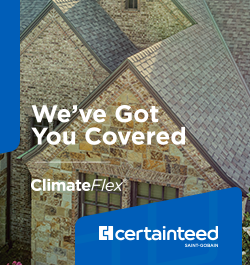Help Homeowners Choose Energy Efficiency with DECRA Metal Roofing

By Trevor Underwood, DECRA Metal Roofing.
DECRA Metal Roofing offers the energy efficiency and durability homeowners look for.
As a roofing contractor, you do more than just install the roof; you also help advise the homeowner on what options work best for them. Every homeowner has a different priority for what they want out of their roof, from energy efficiency to durability, so it’s the roofing contractor’s job to know all of the possible products and materials they can offer the homeowner.
Luckily, with DECRA Metal Roofing, you can offer longevity without sacrificing energy efficiency. Offer your clients strength and style, so that they can get the most out of their roof. Read on for more energy-efficient highlights of DECRA metal roofs that you can help advise homeowners with.
How DECRA Stone-Coated Metal Roofing improves energy efficiency
When it comes to improving energy efficiency (aka thermal performance) with a roof upgrade, there are three characteristics to consider. These include:
-
Emissivity: The ability of the roof to radiate solar heat gains up and away from the house or building.
-
Thermal resistance: The measurement of a temperature difference by which a material resists a heat flow.
-
Reflectivity: The ability of the roof to reflect radiant heat back to the direction from which it came before it has a chance to be absorbed.
Since metal roofs reflect heat up away from buildings, they are known as one of the most energy-efficient roofing materials. Take the metal hood of a car, for example. Even with the heat from the sun and the engine above and below, the metal hood quickly cools when the car is parked in the garage and the engine is turned off. In just minutes, the metal hood has dissipated the heat so well that the car feels cool to the touch.
Many asphalt roofs, on the other hand, absorb heat like a sponge and radiate heat down into the home long after the sun goes down.
In fact, a 2019 study by R&D Engineering compared the energy efficiency of DECRA metal roofs against conventional 3-tab asphalt shingle roofs and found that DECRA metal roofs increased energy efficiency by up to 218%.
And while an uncoated, standing seam metal roof can upgrade a roof’s overall emissivity and reflectivity, DECRA stone-coated metal roofs take thermal performance even further.
Infrared-blocking color pigments in DECRA’s stone-coated granules effectively block infrared radiation from the sun that is the source of accumulating heat. These infrared-blocking pigments increase the natural solar reflectance of the metal roof substantially more than other metal roofing products.
Save on cooling and heating costs with a DECRA Metal Roof
By reflecting heat up and away from the home, metal roofs can decrease attic temperatures by as much as 69%.
The reflective properties of modern metal roofing can reduce cooling costs by up to 25% and homeowners with a DECRA roof can see even higher savings.
These savings add up year after year, especially considering a metal roof has a lifespan that is two to three times longer than traditional roofing materials like asphalt shingles.
But saving on cooling costs is just one of the ways to sell homeowners on the value of upgrading to a DECRA metal roof.
A modern metal roof can increase home value by up to 6% and homeowners who upgrade to metal roofing are typically able to recoup an extremely high rate of the roof’s cost, 85.9% according to national averages, with homes in the Eastern states recouping up to 95.5%. Plus, metal roofs qualify for insurance discounts in many states. For example, in Texas, a metal roof can even lower your homeowner's insurance by up to 35%.
Solar installation options for added energy efficiency
The concept of using solar power as an energy source has been around for centuries. But within the last few years, demand for solar energy has grown, with the market projected to reach $222.3 billion by 2026 (up 20.5% from 2019).
A federal study revealed that if Americans installed solar panels on every roof, it would supply 39% of the total power used by the U.S. What’s more, California alone could generate 74% of its electricity.
Fortunately, solar energy panels can easily be installed on DECRA metal roofs. The following manufacturers of solar mounting systems are designed specifically for stone-coated metal roofing:
Quickbolt:
- Ideal for batten installs (DECRA Tile and DECRA Shake)
- Quick and easy on new installs or retrofit
QuickMount PV:
- Ideal for direct-to-deck installs (DECRA Villa Tile, DECRA Shingle XD, DECRA Shake XD)
- Requires penetrations – Underpans/TUK
Installing solar arrays on roofs has many benefits–beyond improved energy efficiency. These include:
-
Sustainability: Using solar energy to power a home minimizes the household’s carbon footprint. Since it's a renewable energy source, you can’t run out of it. It allows you to continuously power your home without creating pollution.
-
Profitability: As mentioned above, using solar arrays to power a home saves money in the long run. Plus, it’s easy to find a solar roofing option that meets specific exterior requirements.
Supercharge energy efficiency with DECRA Metal Roofing
When you’re working with a homeowner who is looking for an energy-efficient roofing solution, DECRA Metal Roofing makes for an easy sell–and it’s just as easy to add DECRA Metal Roofing to your service offerings.
Learn more about DECRA in their RoofersCoffeeShop® Directory or visit DECRA.com.
Original article source: DECRA






















Comments
Leave a Reply
Have an account? Login to leave a comment!
Sign In